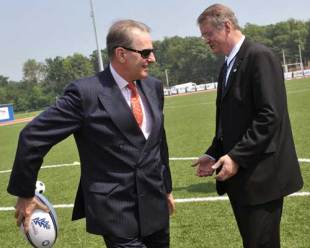|
International Rugby
Lapasset's Olympic dream in sight
John Taylor
August 13, 2009

IOC chairman Jacques Rogge (L) and IRB chief Bernard Lapasset (R) have forged a strong relationship
© Getty Images
Enlarge
This is a momentous day for rugby. IRB chairman, Bernard Lapasset, has seen his strategy for the globalisation of the game edge closer to success after the International Olympic Committee's executive board recommended Sevens for inclusion in the summer games from 2016. Those recommendations will then be put before the full IOC membership in October but that is expected to be a rubber stamping exercise - the all important decision is today. The last time the IOC went through this exercise in 2005 they ejected two sports from the Olympic programme but resisted the allure of rugby Sevens and the other hopefuls, opting not to replace them. This time it is different. They are committed to introducing two new sports out of the seven which have been busy petitioning them. Since Lapasset took over as IRB chairman last year he has worked tirelessly on the campaign for inclusion in the Olympics realising that it is the key to expansion in countries such as China, India, Russia, Brazil - and even the United States of America. The mistake last time round was the arrogant assumption that they would be welcomed with open arms. There is no doubt that Sevens is ideal in many ways. The tried and tested format of a two day competition could easily be accommodated in the main stadium in the first few days before the athletics programme starts. It has proved one of the most popular spectator sports since it was introduced into the Commonwealth Games so it would certainly be successful commercially. But there is also a down-side. It is not the main form of the game - a 15-a-side tournament would be impossible because of the sheer numbers involved and the length of time it would take. Rugby also suffers from being a very minor sport in many of the countries with the biggest economies such as those mentioned above. The IOC are also committed to introducing sports which appeal to participants from both sexes and women's rugby was until recently only played in the traditional rugby heartlands. The introduction of a women's Sevens World Cup running in tandem with the men's competition earlier this year in Dubai was a vital demonstration of the growth of the women's game. In 2005 the IRB representatives complained that they were sidelined even though they made themselves available to meet with IOC members at all times. They simply did not understand the diplomacy and politics of the Olympic movement. Lapasset has already broken down those barriers. With a travel schedule that an airline pilot might have blanched at he has travelled the world meeting all the IOC committee members on their home ground to put the case for rugby. He has also forged a close alliance with Jacques Rogge, the President of the IOC, who played rugby for Belgium as well as competing as a yachtsman in three Olympic Games. In 2005 some of the people voting did not even understand rugby and thought of it as a strange renegade sport that defied the IOC ban on contacts with South Africa during the apartheid years and was played mainly by countries that had been a part of the British Empire. Having a Frenchman as Chairman of the IRB for the first time has been vital in changing perceptions. If Lapasset has been successful the rewards for rugby are enormous. In many countries Olympic sports are the only ones that automatically receive government funding and that does not only apply to the old eastern bloc states. Ex-England scrum-half and captain, Nigel Melville, now head of USA rugby will be amongst those hopeful of a windfall in terms of direct funding if this goes through. Countries such as China, where Olympic medals are used as a barometer of success, will invest heavily in a rugby programme for the first time and the whole development of the game will receive the biggest kick-start in its history. That, in turn, will put the sport on the radar of the major television companies in the major economies where rugby currently has almost no profile and that will attract sponsorship from multi-national companies that would not even consider rugby in most of their territories at the moment. That is why it was vitally important that the IRB decision to award the 2019 World Cup to Japan (the first tournament outside the founder nations) went through in time to register for this vote. The final touch has been to make it known that the Olympics will replace the Sevens World Cup. IOC members love to feel that the Games represent the pinnacle of achievement in a sport and are not just another, albeit high profile, event. © Scrum.com
|
Live Sports
Communication error please reload the page.
-
Football
-
Cricket
-
Rugby
-
- Days
- Hrs
- Mins
- Secs
F1 - Abu Dhabi GP
Abu Dhabi Grand Prix December 11-131. Max Verstappen ()
2. Valtteri Bottas (Mercedes)
3. Lewis Hamilton (Mercedes)
4. Alexander Albon ()
5. Lando Norris ()
6. Carlos Sainz Jr ()
-
ESPNOtherLive >>
Golf - Houston Open
Snooker - China Open
Tennis - Miami Open

